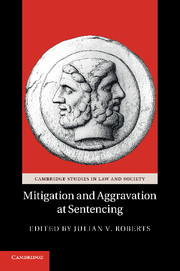Book contents
- Frontmatter
- Contents
- Tables
- Contributors
- Foreword
- Acknowledgments
- Chapter one Punishing, more or less
- Chapter two Re-Evaluating the Justifications for Aggravation and Mitigation at Sentencing
- Chapter three The Search for Principles of Mitigation
- Chapter Four Personal Mitigation and Assumptions about Offending and Desistance
- Chapter Five Intoxication as a sentencing factor
- Chapter Six Beyond the Partial Excuse
- Chapter Seven Equality before the law
- Chapter Eight Personal mitigation
- Chapter Nine Exploring Public Attitudes to Sentencing Factors in England and Wales
- Chapter Ten The Pernicious Impact of Perceived Public Opinion on Sentencing
- Chapter Eleven Addressing Problematic Sentencing Factors in the Development of Guidelines
- Chapter Twelve Proof of Aggravating and Mitigating Facts at Sentencing
- Chapter Thirteen Mitigation in Federal Sentencing in the United States
- Chapter Fourteen The discretionary effect of mitigating and aggravating factors
- Index
- References
Chapter Fourteen - The discretionary effect of mitigating and aggravating factors
A South African case study
Published online by Cambridge University Press: 07 September 2011
- Frontmatter
- Contents
- Tables
- Contributors
- Foreword
- Acknowledgments
- Chapter one Punishing, more or less
- Chapter two Re-Evaluating the Justifications for Aggravation and Mitigation at Sentencing
- Chapter three The Search for Principles of Mitigation
- Chapter Four Personal Mitigation and Assumptions about Offending and Desistance
- Chapter Five Intoxication as a sentencing factor
- Chapter Six Beyond the Partial Excuse
- Chapter Seven Equality before the law
- Chapter Eight Personal mitigation
- Chapter Nine Exploring Public Attitudes to Sentencing Factors in England and Wales
- Chapter Ten The Pernicious Impact of Perceived Public Opinion on Sentencing
- Chapter Eleven Addressing Problematic Sentencing Factors in the Development of Guidelines
- Chapter Twelve Proof of Aggravating and Mitigating Facts at Sentencing
- Chapter Thirteen Mitigation in Federal Sentencing in the United States
- Chapter Fourteen The discretionary effect of mitigating and aggravating factors
- Index
- References
Summary
The sentence imposed in a South African court depends primarily on the discretion of the presiding judicial officer, the sentencer. The sentencer is expected to come to a reasonable decision regarding an appropriate sentence, based on all the facts relevant to the case. These facts might be aggravating, mitigating or even neutral in their effect on the sentence. The sentencer should explain in the judgment why the eventual sentence is appropriate. This judgment usually states that all the relevant facts and factors have been taken ‘into account’ or have been considered, but the extent to which such factors actually affect the sentence usually remains a mystery.
However, the purely discretionary sentencing model is not the only model in place, as South African law currently employs two different but parallel sentencing models, where the roles of mitigating and aggravating circumstances are not quite the same. The first model could be described as the traditional position; the second manifests itself within a wide-ranging scheme of minimum custodial sentences that affect most of the more serious crimes. Within the traditional model the sentencer’s discretion determines the complete creation of the sentence, but with the minimum-sentences scheme the starting points are provided by the legislature. Whereas the details of the minimum sentences are uniquely South African (Terblanche and Mackenzie 2008), the same is not true of discretionary sentencing – here South African law has much in common with other parts of the world.
- Type
- Chapter
- Information
- Mitigation and Aggravation at Sentencing , pp. 261 - 277Publisher: Cambridge University PressPrint publication year: 2011
References
- 1
- Cited by



